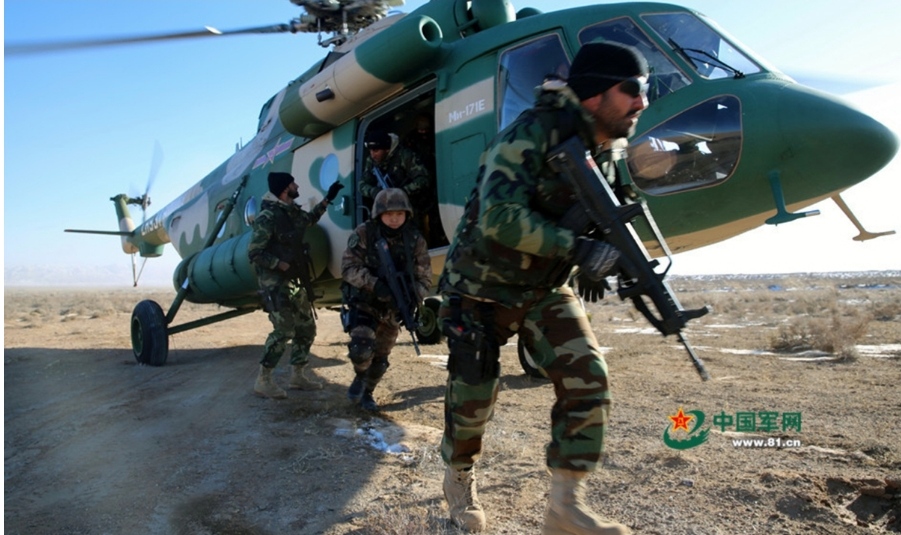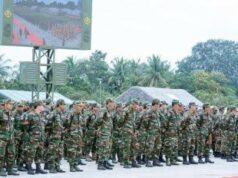Why China and Pakistan are trying desperately to enhance coordination against India?
By
Colonel Awadhesh Kumar

Soldiers from China and Pakistan prepare to conduct assault during a joint anti-terrorism training.
In recent years, the global and regional security set ups have undergone drastic upheavals. Recent change of strategic situations in South Asia and neighboring region that is Central Asia is mainly reflected in the Pakistan’s Support to terrorism, trouble in Sind, Baluchistan and Pakistan Occupied Kashmir, China’s support to Pakistan, China’s continued occupation of Tibet and parts of India’s Ladakh, oppression of Uighurs and the ongoing Afghan issue.
The US hastily withdrew its troops from Afghanistan and the Afghan Taliban quickly took over Kabul and are now in control of nearly all Afghan territory. Many strategists and media in the West have linked the Afghan Taliban’s seizure of power with China-Pakistan relations, China-India relations and USA – China relations. They believe that the successful seizure of power by the Afghan Taliban is a success of China and Pakistan, but a strategic failure of the US and the West. The reason why they have this interpretation is mainly due to their geopolitical thinking and zero-sum game thinking.
On a larger regional level, in order to contain India, the Chinese are trying their best to promote military competition and even confrontation between India and Pakistan. On the other side the Chinese are also promoting confrontation in the Indo-Pacific region by threatening Taiwan directly and others indirectly.
The US has therefore created a military block in the form of AUKUS and also continues to promote the institutionalization of the Quad. India is an important pillar of both the regions ie Central Asia and the Indo-Pacific. India also has the potential to achieve its goal of becoming a global power in the foreseeable future. To this end India has no choice left but to assert itself in not only in Indo Pacific, South Asia but most immediately in Central Asia.
To achieve its geo-strategic objectives, India must play a greater role on the Afghan issue but on its own terms and as per a well laid down Action Plan. China is attempting its level best to harm India’s interests by not only its strategic moves against India through Occupied Tibet but by also making Pakistan its agent in the region to keep provoking India.
As far as India is concerned, Pakistan has become a failed State and has been marginalized in World Affairs. Slowly it has started feeling the folly of its Afghan Policy too, as Taliban seems to be no longer following its diktats.
Once India starts playing a role in Afghanistan, it is going to play a positive one of Development. India is likely to use its soft power skills with keeping its military power in the reserve, in both Afghanistan and the surrounding countries in the Region to promote trade and commerce along with Security. For the past more than 20 years, India has been playing a very positive role in Central Asian Republics. This is going to be unfavorable to China, Pakistan and those factions of Taliban who operate under the orders of Pakistan ISI.
As all-weather strategic partners, China and Pakistan will be working together to disrupt security and stability of not only India but the entire Region. Even Iran and the Central Asian Republics including many in Taliban seem to be fully aware of this fact.
China and Pakistan are cooperating closely on the Afghanistan to persuade the Afghan Taliban to work out a foreign policy which supports Chinese involvement in Afghanistan. This only can safeguard and promote its control of the region through expansion of the BRI Policy. At present, the verbal expression of the Afghan Taliban is very different from that in the past, so both China and Pakistan have become very apprehensive. They are now not sure about the specific policies which Taliban will champion in the future.
The Afghan Taliban are now facing a series of severe challenges. First, the unity of Afghan Taliban itself; Second, whether the Afghan Taliban can establish an open and inclusive government; Third, food shortage is likely to lead to humanitarian disasters and refugees; Fourth, they hope to win the recognition and assistance of the international community, but at the same time, they also face the blockade, sanctions and even severe opposition to many of their brutal actions.
The World at large hopes that the Afghan Taliban can establish an open and inclusive Government so that all ethnic groups and parties in Afghanistan can have their own representatives, which is the key for the Afghan Taliban to win domestic and international support. India does not want Afghanistan to fall into turmoil again due to domestic political struggle that always leads to humanitarian crises.
In fact China is now very worried that Afghanistan may start providing shelter and bases to Eastern Turkistan Liberation forces such as the ETIM. China does not want Afghanistan to become a source of unrest in its Occupied regions. Then it will be forced to deploy massive forces to keep control of East Turkmenistan and Xinjiang. China will also face massive problem in occupied Tibet and it will have no option left but to vacate occupied portions of India’s Ladakh. Pakistan too will have to vacate POK sooner than later. This will lead to crisis for CPEC and onwards for the entire BRI.
Therefore, on the issue of Afghanistan, China and Pakistan are trying desperately to rope in Russia, Iran and all the other Central Asian countries. After creating the crisis by backing Taliban against an elected Government of Afghanistan, now China and Pakistan are trying to warn rest of the World of a possible refugee crisis, and are trying to get pressure put on India, European countries and the USA to take responsible actions to provide humanitarian assistance to Afghanistan.
While strengthening strategic and security coordination against terrorist supporters, India must work with countries inside and outside the region to promote the construction of an open, inclusive, democratic and equal regional governance set up and a robust security structure.



